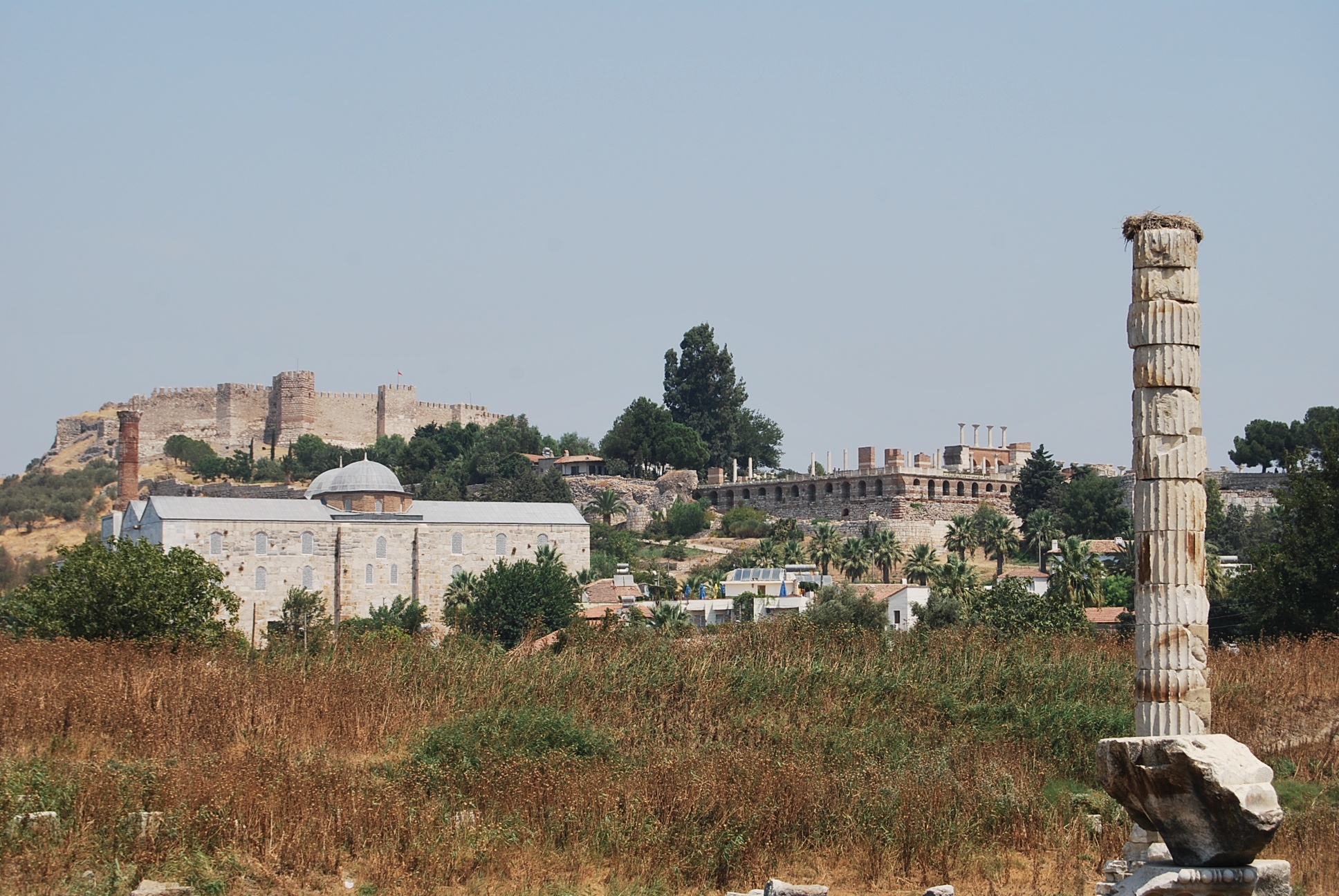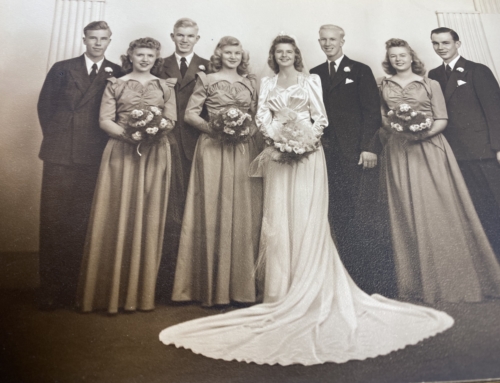There’s a hillside in Turkey where you can stand and see the ruins of three great religions.
From that vantage point, it’s hard not to be in awe of the vastness of history and the momentary accomplishments of mankind.
It’s also easy to look at and quickly become cynical of religion, its twisted relationship with the State, and its place in history.
From this hillside you realize that religions, like empires, are temporary things.
This is an important realization for any well-meaning Jesus follower.
The Bible Happened in Real Places
A few weeks ago my wife and I had the opportunity to go on the trip of a lifetime. Over a period of two weeks we visited parts of Greece and Turkey.
We stretched out a layover in Athens so we could take in the Acropolis and Parthenon. We stayed on the volcanic island of Santorini, where we saw the ash-buried 6,000-year-old city of Akrotiri. We wandered through the Hagia Sofia, Blue Mosque, and other architectural wonders of Istanbul. We bathed in the Cleopatra’s Pool near what was once Hieropolis. We climbed through cave cities that housed the Cappadocian Monks. We saw the towering remains of Ephesus.
I’ve always had a bit of an obsession with places like this. When I was a kid, I had a VHS slideshow of various sites central to Biblical Archeology. On Friday nights in elementary school, I’d beg my family to sit with me and talk about what we know today of the Hittites, the Egyptians, and the Greeks.
As I’ve grown older, planted a church, and worked with various parachurch organizations, I’ve come to spend more and more time focusing on things like education and ecclesiology. My passion has moved on to the practical question ‘how can we live the life that Jesus taught’.
This is a good shift, a practical one.
But standing on that hillside in Turkey I was reminded of a basic, essential prerequisite we must all remember as we try to follow Jesus and lead others to do the same:
The Bible happened in real places.
Remember that the Bible happened in real places. Click To TweetGreat Was Artemis of the Ephesians
Ephesus dates back at least to the Hittite era. It was a port city where they worshiped a mother goddess named Cybele.
Legend has it that around the 10th century BC an Athenian prince was looking for a place to start a new city. An oracle had told him that ‘a fish and boar would show him the way’. One morning while the party was cooking breakfast, a fish jumped out of the pan. This started a fire which drove out a wild boar.
With this inspiration, the prince started a new Greek city on the site. He renamed it Ephesus, and the worship of Cybele transitioned to the worship of Artemis.
Ephesus flourished. On one side they had some of the richest soil in Asia Minor and access to the silk road. On the other side they had they built a port to trade with the rest of ancient Europe.
They built a city of marble. They built a stadium that sat tens of thousands of people. They built a two-story teaching hospital. They built a sprawling library.
But most importantly, they built the Temple of Artemis, one of the Seven Wonders of the World.
A Riot in Ephesus
Here’s how N.T. Wright introduces the Temple of Artemis in Acts for Everyone:
Artemis was indeed great. She (Artemis is her Greek name; her Roman name is Diana) was the most powerful divinity in the place, and had been for a long time. In the distant past a meteorite had smashed into the surface of the earth somewhere near Ephesus, and the local people had regarded it as a gift from heaven, a statue (though presumably not very life-like) of the goddess herself. That’s what the town clerk is referring to in verse 35. The temple of Artemis was massive, and her cult — run entirely by female officials — was the religious centre of the whole area. Images of Artemis, large and small, dominated the city. Archaeologists have found dozens of them, with the distinctive mother-goddess feature of multiple breasts. What was once manufactured as an object of religious devotion is still today manufactured for sale in the area, only as a tourist souvenir.
Paul is the first great missionary. The book of Acts is in many ways his travelogue, written by the historian and gospel writer Luke.
We often think of Paul teaching (or arguing with) other Jews, causing trouble in the local synagogues. But much of that pales in comparison with what happened in Ephesus.
When you walk through the remains of Ephesus, it’s easy to imagine what happened. You can still walk the marble streets, and see the mosaic tile that created of the porticoes outside the shops.
Wandering teachers like Paul would set up on a street corner, perhaps outside a shop or the giant Library of Celsus, and share their good news. But unlike the other teachers who educated and inspired, Paul was a threat to the local economy.
Paul’s message that Jesus was Lord. This meant a lot of things, but one of them clearly effected Ephesus. It meant that Artemis was not. This teaching quickly became a problem for vendors who profited off of temple-related wares.
Less than a 10-minute walk from the Library of Celsus is a great stadium. A silversmith who had built up his own little empire by selling Artemis-themed trinkets gathered a crowd to complain about Paul’s teaching.
‘Gentlemen,’ he began. ‘You know that the reason we are doing rather well for ourselves is quite simply this business of ours. And now you see, and hear, that this fellow Paul is going around, not only Ephesus but pretty well the whole of Asia, persuading the masses to change their way of life, telling them that gods made with hands are not gods after all! This not only threatens to bring our proper business into disrepute, but it looks as if it might make people disregard the temple of the great goddess Artemis. Then she – and, after all, the whole of Asia, indeed the whole world, worships her! – she might lose her great majesty.’
Ephesians 19:26-27, Kingdom New Testament
The crowd was threatening to riot when the town clerk stepped and instructed them to calm down and file proper charges against Paul. As quickly as he could, Paul skipped town.
In this story, N.T. Wright sees an inevitable clash that all will deal with who demonstrate the counter-cultural way of Jesus.
We're inclined to look at the riot in Ephesus & thank God that we don’t do things like that. Click To TweetMany of us in the West have lived quite comfortably with all these things in separate compartments, and everything clinically wrapped so that nothing can leak from one compartment to another. We are inclined to look at the riot in Ephesus, shudder, and thank God that we don’t do things like that any more.
…We should think again about the way in which wickedness gets a grip on a society, somewhere down below its polite exterior, and about the way in which, sooner or later, someone needs to take their courage in one hand and their Bible in the other, throw to the winds any caution about their own prospects, and say what needs to be said. And we shouldn’t miss, either, the way in which, once again, the gospel functions as a critique of all temples, whether the Parthenon in Athens, the temple of Artemis in Ephesus, or even, as in chapter 7, the Temple in Jerusalem itself. Is that, too, a theme which Luke is gently rubbing in?
The Falls of Artemis
Paul’s trip to Ephesus took place in the period of the city’s splendor. In the years and centuries to come, Ephesus would face ongoing ecological and economic problems.
The city was built on a port. Silt would wash in from throughout the Aegean sea and fill up the port. Every few centuries it had to be relocated. Like many ancient cities, Ephesus suffered from plagues. Outbreaks of diseases like malaria chipped away at the city’s viability.
Then, in the fourth century A.D., Emperor Constantine moved the capital of his revitalized eastern Roman empire to Constantinople. Businesses moved to the new capital. The grandeur of Ephesus with it’s economic might and awe-inspiring temple faded.
Constantine brought with him a new, imperially-enforced brand of Christianity. Up the hill from the temple of Artemis was built the Basilica of St. John. A few centuries later, Emperor Justinian tore it down and created a massive monument. They scavenged through the Temple of Artemis for building materials.
Today little remains of the Basilica. Up the road again, you can find the Isa Bey mosque, constructed in the fourth century. The mosque has also generally fallen into disrepair. However, if you look at its base, you can find great marble bricks that had been used in the Basilica of St. John and in the Temple of Artemis before that.
Great was Artemis of the Ephesians.
But her temple fell.
And two other temples after it.
King Jesus and the Empires
Standing on that hillside in Turkey, it was easy to get lost in the grandeur of it all. But as I’ve reflected back on that time, I have to ask myself “why do we still follow Jesus today?”
It might be easy to gloat and say “great WAS Artemis of the Ephesians.” Paul was right, Demetrius was wrong. It was only a matter of time.
However, you can’t gloat, because from that same hillside you see the remains of other religious movements, Byzantine Christianity and Islam. It would be easy to look at them and ‘think they’re all the same’. Religion is nothing but political or economic tools used to control the masses and benefit a few.
The problem is, that’s not the story that scripture tells. The Bible happened in real places—where else could it happen? But these places are only a backdrop for the story scripture is telling.
Acts tells a story about how, in a world of temples and empires, a few of Jesus’s early followers spread the good news that Jesus is Lord, and Caesar is not. They didn’t do it by tearing down temples or plotting coups.
It’s much more simple—perhaps even boring. They established little communities, much like extended families. Because of their new Lord, Jesus, these new families played by different rules.
Slaves were as valued as free men. Women were as valued as men. Economies, built by the Demetriuses of the world, which traded expensive idols for spiritual hope, were replaced by a shared economy where the poor and the rich took care of each other.
It’s easy to stand on that hillside in Turkey and write off the religions and empires that have come and gone. But today, there are still women and men around the world who make Jesus their King. Today, just like then, making Jesus king has a way of changing the balance of power. Today, King Jesus is still giving hope, for life now, and after death.
Empires have come and gone. Religions have, as well. But Jesus’s good news is still good news, and it can still threaten empires today.
Jesus's good news is still good news, and it can still threaten empires today. Click To TweetLatest posts by Chris Morton (see all)
- Paul Small Group Giveaway - August 27, 2021
- N.T. Wright on Psalms, Devotional Life and Worship Music - August 19, 2021
- Cokesbury - July 9, 2020





![[Video] There’s more to ‘joy and peace’ than you might think](https://www.ntwrightonline.org/wp-content/uploads/2021/03/tamara-menzi-HQ_Vh1fSWHk-unsplash-500x383.jpg)
